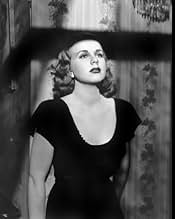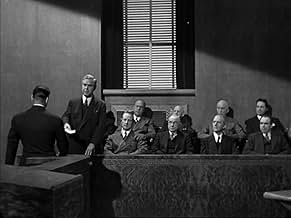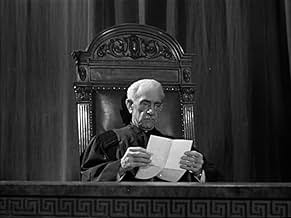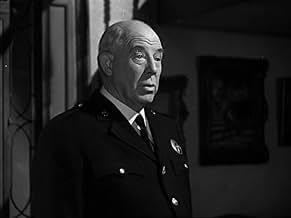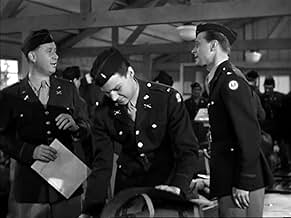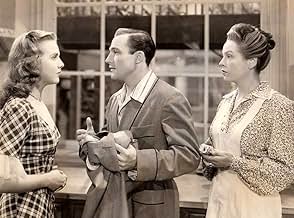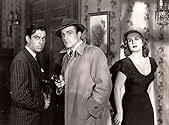VALUTAZIONE IMDb
6,4/10
1762
LA TUA VALUTAZIONE
Una giovane donna si rende conto che l'uomo che ha sposato è un perdigiorno incorreggibile.Una giovane donna si rende conto che l'uomo che ha sposato è un perdigiorno incorreggibile.Una giovane donna si rende conto che l'uomo che ha sposato è un perdigiorno incorreggibile.
- Regia
- Sceneggiatura
- Star
- Candidato a 1 Oscar
- 1 candidatura in totale
Eddie Acuff
- Steve
- (non citato nei titoli originali)
Fred Aldrich
- Bartender
- (non citato nei titoli originali)
Frank Austin
- Jury Member
- (non citato nei titoli originali)
John Barton
- Concertgoer
- (non citato nei titoli originali)
Vangie Beilby
- Wedding Guest
- (non citato nei titoli originali)
John Berkes
- Waiter
- (non citato nei titoli originali)
Oliver Blake
- Defense Attorney
- (non citato nei titoli originali)
Charles Cane
- Joe
- (non citato nei titoli originali)
Wheaton Chambers
- Plane Passenger
- (non citato nei titoli originali)
Ruth Cherrington
- Concertgoer
- (non citato nei titoli originali)
James Conaty
- Concert Patron
- (non citato nei titoli originali)
Recensioni in evidenza
Pairing sunny star Deanna Durbin with stormy director Robert Siodmak is like coupling Snow White with Orson Welles. So who's going to win out—Universal's top money earner or noir's artistic vision. It's a struggle between luminous halos, on one hand, and creepy shadows, on the other. Actually the odd pairing works pretty well, thanks to Durbin's genuine acting ability, Gene Kelly's subtle ambiguity, and an unusually suggestive script. Clearly, Durbin is looking to change her virginal type casting, while Kelly has yet (I believe) to settle into his premier dancing career.
But, it's really Kelly's Manette who steals the film, with both a startlingly sly performance and the script's unconventional suggestions of incest and homosexuality. For example, there's a rather emphatic reference to Manette's being his mother's "all", plus mom's (Sondergaard) consuming attachment throughout the film. There's also repeated reference to Manette's "weakness", just ambiguous enough to go beyond a gambling habit. Couple that with his shaded behavior in several scenes, especially in the "anything goes" gambling den. Needless to say, such forbidden themes could only be hinted at in 40's Hollywood.
Adding to the 40's exotica is Durbin playing what amounts to a barroom hooker. She may remain pure at heart—confirmed in the midnight mass scene—nonetheless, the role amounts to a risky departure for Universal's teen idol. Thus director Siodmak's challenge is to reaffirm Abigail's (Durbin) basic innocence no matter what else happens, which he does through selective cameo lighting, even though that conflicts with his noirish sensibility. Then too, Dean Haren's sweetly normal escort is there to reassure fans that underneath it all, Durbin remains Durbin.
And to think the studio entitled this odd excursion into the dark side, Christmas Holiday, of all things. I sympathize with unsuspecting fans plunking down money to see the usual Durbin fluff. Nevertheless, the movie remains a fascinating study in conflicting styles and ambiguous characterization.
But, it's really Kelly's Manette who steals the film, with both a startlingly sly performance and the script's unconventional suggestions of incest and homosexuality. For example, there's a rather emphatic reference to Manette's being his mother's "all", plus mom's (Sondergaard) consuming attachment throughout the film. There's also repeated reference to Manette's "weakness", just ambiguous enough to go beyond a gambling habit. Couple that with his shaded behavior in several scenes, especially in the "anything goes" gambling den. Needless to say, such forbidden themes could only be hinted at in 40's Hollywood.
Adding to the 40's exotica is Durbin playing what amounts to a barroom hooker. She may remain pure at heart—confirmed in the midnight mass scene—nonetheless, the role amounts to a risky departure for Universal's teen idol. Thus director Siodmak's challenge is to reaffirm Abigail's (Durbin) basic innocence no matter what else happens, which he does through selective cameo lighting, even though that conflicts with his noirish sensibility. Then too, Dean Haren's sweetly normal escort is there to reassure fans that underneath it all, Durbin remains Durbin.
And to think the studio entitled this odd excursion into the dark side, Christmas Holiday, of all things. I sympathize with unsuspecting fans plunking down money to see the usual Durbin fluff. Nevertheless, the movie remains a fascinating study in conflicting styles and ambiguous characterization.
What a surprise treat to see this rare film as part of a Robert Siodmak Festival at the Cleveland Art Museum in the summer of 2014. It put me back in the mid-WWII period and the beautiful, pristine 35mm print was shown as originally presented on the big screen, thanks to Film Curator John Ewing.
The major attraction here is that Deanna Durbin and Gene Kelly both play against type in a "doctored up" Somerset Maugham story. Siodmak direction is dark, atmospheric and smoothly executed throughout. Deanna sings Irving Berlin's "Always" in a pop style very effectively. A good portion of Wagner's "Liebestod" from Tristan and Isolde is heard in an orchestral setting to heighten the dramatic proceedings.
Both stars work surprisingly well in their very heavy roles, and I found myself glued to the screen during Durbin's depiction. Her acting style has often been subtle, and this performance was one of her most understated. Kelly's role challenged him to reach dramatic heights, and he rises to occasion.
While some of the script is dated, Deanna dominates the screen whenever she's on, and is matched by a fine supporting cast. Truly a worthwhile viewing.
The major attraction here is that Deanna Durbin and Gene Kelly both play against type in a "doctored up" Somerset Maugham story. Siodmak direction is dark, atmospheric and smoothly executed throughout. Deanna sings Irving Berlin's "Always" in a pop style very effectively. A good portion of Wagner's "Liebestod" from Tristan and Isolde is heard in an orchestral setting to heighten the dramatic proceedings.
Both stars work surprisingly well in their very heavy roles, and I found myself glued to the screen during Durbin's depiction. Her acting style has often been subtle, and this performance was one of her most understated. Kelly's role challenged him to reach dramatic heights, and he rises to occasion.
While some of the script is dated, Deanna dominates the screen whenever she's on, and is matched by a fine supporting cast. Truly a worthwhile viewing.
I was lucky enough to catch a rare screening of this never-on-video film at the Cinematheque here in Hollywood last night. It was very beautiful, moving even, with lovely black-&-white cinematography by Woody Bredell. Other users' comments to the contrary, Gene Kelly's role is most definitely not insignificant - he's the villain, for crying out loud! His genuinely complex and subtle performance is a real standout in a film filled with wonderful work by all of the actors. Gale Sondergaard, also, is clearly well-cast, too, as Kelly's mother; she may have been a little young for the role in real life, but that certainly doesn't come across in her portrayal of the stifling, weak-willed, coddling mother of a killer. Deanna Durbin, though always more of a performer than an actor per se, is more than convincing as a world-weary singer in a whorehouse (not a night club; though it's never explicitly identified as a house of ill repute, only the most boneheaded viewer would take it for anything else). Her tearful breakdown in the church during Christmas Eve mass (an exquisitely rendered set piece, full of deep, soft shadows and luminous pools of communal light) is genuinely touching and heartfelt. And the film's final moments, if accepted unironically (as they were intended), are truly poetic and uplifting.
If you want to see a film version of Somerset Maugham's "Christmas Holiday", you'll have to wait a while. This isn't it, despite the credit. "Suggested by..." would have been a more accurate credit. Maugham's tale is set in prewar Paris and concerns a young English college student who goes to Paris to see the sights during his Christmas vacation. This film updates the action to WW2 and concerns a lieutenant just graduated from flight school on leave to get married in San Francisco. Grounded by bad weather in New Orleans, he receives a telegram from his fiancée announcing her marriage to some other cluck. He decides to continue to S.F., presumably bent on vengeance. From here on film and Maugham more less parallel each other in broad outline, but all of Maugham's discussions between the student and his radical journalist friend about politics, sex, society and other more or less tabu topics in 1944 Hollywood are eliminated. In the film, the journalist is a pestiferous, drunken ne'er-do-well who frequently acts as a pimp for Gladys' dive. In the original story, Deanna's character, named Sonya, is a Russian émigré forced into prostitution to support herself and her sociopathic lover. Stripped of all of Maugham's philosophical thrust, we have just another film-noir/weeper, although it's not too bad in many respects. Not to reveal the melodramatic denouement tacked on by Hollywood, I'll only say that Maugham's story ends without any resolution, except possibly the student's regret that after being introduced to Sonya, he didn't see Paris, and all he got out of Sonya was conversation. In that, film and story agree.
Well, there you are! Somerset Maugham's "Christmas Holiday" indeed! But it's not as bad as some critics declare. Pauline Kael didn't like it, of course. But it is interesting as a film noir, and Deanna's first, perhaps only real, chance at a dramatic vehicle. Helen Hayes, or even Jane Greer, she wasn't, but then it's doubtful that Universal ever made any effort to develop her acting talent beyond the merest fundamentals. Also she didn't have the long film background of a Helen Parrish. She does present a winsome, sympathetic girl plunged into bad circumstances when her attractive husband proves a murderer and general bad type. Added to that, her mother-in-law casts her out after the husband's conviction. It's not a great performance, but Hollywood has produced many worse. Gene Kelly and the rest of the cast are very good. Kelly is in a very early role, the others are mostly veterans. It's a very moody piece, with photography to suit, and not at all what you would have gotten if Maugham's real story had been filmed.
Oh, yes. Deanna gets to sing two songs. Early on we get "Spring will be a little late this year", which is a slightly jazzy torch song, and later in the film, "Always", beautifully and wistfully delivered by Deann.
Well, there you are! Somerset Maugham's "Christmas Holiday" indeed! But it's not as bad as some critics declare. Pauline Kael didn't like it, of course. But it is interesting as a film noir, and Deanna's first, perhaps only real, chance at a dramatic vehicle. Helen Hayes, or even Jane Greer, she wasn't, but then it's doubtful that Universal ever made any effort to develop her acting talent beyond the merest fundamentals. Also she didn't have the long film background of a Helen Parrish. She does present a winsome, sympathetic girl plunged into bad circumstances when her attractive husband proves a murderer and general bad type. Added to that, her mother-in-law casts her out after the husband's conviction. It's not a great performance, but Hollywood has produced many worse. Gene Kelly and the rest of the cast are very good. Kelly is in a very early role, the others are mostly veterans. It's a very moody piece, with photography to suit, and not at all what you would have gotten if Maugham's real story had been filmed.
Oh, yes. Deanna gets to sing two songs. Early on we get "Spring will be a little late this year", which is a slightly jazzy torch song, and later in the film, "Always", beautifully and wistfully delivered by Deann.
Hmmm, I wonder of Tennessee Williams saw this in 1945 and wrote SUDDENLY LAST SUMMER as a riff on this astonishing incestuous masochistic noir. Universal's 1944 "Christmas Holiday"is a startling dark film that is quite explicit in its adult themes of prostitution, self punishment, sexual manipulation, incest and some quite twisted emotional ideas. It even has scenes similar to that same 1959 Taylor Montgomery Hepburn drama. Cleverly, Universal cast music stars Gene Kelly as the handsome spoiled son with the demon mother (Gale Sondergaard) and cherubic Deanna Durbin as the adoring slavish young woman that Mother encourages he marries to keep his amoral unethical character in check. The idea that Mother enthusiastically endorses their marriage so she can control both of them by their sexual desire for each other is a rank idea as slimy as seen in the pre code shocker THE SILVER CORD. I personally found the film riveting and I very much liked the casting against type. For me it gave the film excellent surprise value. Kelly made a terrific seductive rat. Durbin's slide into willing prostitution to 'be with him' in a decadent lifestyle (while he was away) is a great downbeat storyline. Everything about "Christmas Holiday" is deceptive, right from the happy title to the handsome horror of Kelly's character. I will not spoil the story for you other than to say the whole film is a terrific ride, and with a ripe explicit tone, you will be seduced yourself. Plenty of flashback like SORRY WRONG NUMBER and equally as creepy. What a surprise! Hilariously, in Australia it was our Nationwide TV treat at 8.30pm on Christmas night! Haven't our TV programmers got a sly sense of humor.
Lo sapevi?
- QuizBecause of the Hays Code, screenwriter Herman J. Mankiewicz changed the setting from a Paris brothel to a nightclub in New Orleans, and changed the main character from a prostitute to a more ambiguous nightclub singer and hostess, in adapting the 1939 novel of the same name by W. Somerset Maugham.
- BlooperAfter Robert breaks out of jail, the newspaper spells his last name as "Mannette". However, the correct spelling is "Manette".
- Citazioni
Simon Fenimore: [to Charles] The planes are all grounded, the trains won't do you any good, and you're too big for me to carry on piggyback.
- ConnessioniReferenced in Dai! Johnny, dai (1959)
I più visti
Accedi per valutare e creare un elenco di titoli salvati per ottenere consigli personalizzati
- How long is Christmas Holiday?Powered by Alexa
Dettagli
- Data di uscita
- Paese di origine
- Lingua
- Celebre anche come
- Christmas Holiday
- Luoghi delle riprese
- St Vibiana RC cathedral, Main St, Los Angeles, California, Stati Uniti(midnight mass scene)
- Azienda produttrice
- Vedi altri crediti dell’azienda su IMDbPro
- Tempo di esecuzione1 ora 33 minuti
- Colore
- Proporzioni
- 1.37 : 1
Contribuisci a questa pagina
Suggerisci una modifica o aggiungi i contenuti mancanti

Divario superiore
By what name was Vacanze a Natale (1944) officially released in India in English?
Rispondi

